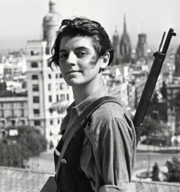Maria Almodovar
Maria Alunya Almodovar | |
|---|---|
 Almodovar in 1944, on a rooftop in the city of Maracaibo. | |
| Born | March 16, 1927 Maracaibo, Maracaibo |
| Died | February 22, 1945 (aged 17) City of Maracaibo, Fourth Ward |
| Allegiance | Democratic Republic of Maracaibo |
| Service/ | City Local Defense, Partisans |
| Years of service | 1943-1945 |
| Rank | Private |
| Battles/wars | Siege of Maracaibo |
| Awards | Allied Nations Medal of Honor (posthumously) |
Maria Alunya Almodovar (March 16, 1927 – February 22, 1945) was a Maracaibean soldier during the Pan-Septentrion War. She is regarded as a national hero in Maracaibo.
Early life
Maria Almodovar was born to a lower middle class family in the Third Ward of Old Maracaibo City. Raised by her father, she was educated up to a high school level before war broke out.
Activities as part of Maracaibo Local Defense
After the Dayashinian Invasion began in the summer of 1943, Almodovar signed up to the Maracaibo City Local Defense, part of the Democratic Republic's Town Defense Initiative to raise a trained militia in each town. Until the first assaults upon the city in late 1944, Almodovar was assigned to searchlight duty to assist in anti-aircraft operations at night, as well as a sentry for the city center.
The Counterattack
As the Imperial Dayashinese Army began to assault the capital in earnest in late 1944, partisans, militia, and regular forces were driven back further into the urban sprawl of the city. Though progress was kept at an incredibly slow creep, crucial ground was lost to the invaders. One such location was an inroad into the city center, a wide avenue called Gran Vía de Bilbao. It was well fortified by a joint force of partisans, and Local Defense members.
On the early morning of February 22, the defensive line came under attack by Dayashinese regulars. The line held initially, most likely due to the two heavy machine guns emplaced there. However, at approximately 9:30 am, the commander of the defense was killed by incoming fire. Such a shock led to a panic in the ranks, and morale dropped significantly. Some defenders began to run. According to multiple eyewitness accounts, Almodovar appeared incensed by her comrades' uncertainty and cowardice. She stood up and yelled above the gunfire:
"¡Ni un solo paso atrás, valientes defensores! ¡Arriba, y a ellos!" ("Not a single step back, valiant defenders! Up, and at 'em!")
The rally cry managed to stabilize the ranks, and Almodovar proceeded to lead one of the few successful counterattacks by Republican forces in the entire war. The defenders pushed back, and managed to gain back three city blocks within forty-five minutes. Upon reaching a previously overrun defensive position currently occupied by a Dayashinian detachment, a group of thirty militia members and partisans, including Almodovar, charged with bayonets. Though the position was taken successfully and remained in Republican hands for the rest of the war, the young leader was killed by multiple high caliber gunshot wounds to the chest.
Legacy
In 1950, Maria Almodovar was posthumously awarded the Allied Nations Medal of Honor.
In 1951, the Almodovar Award for Gallantry in Action was created, the second highest military award in the Allied Nations.
In 1955, her body was interred into the Tomb of Heroes, in North Maracaibo.
In 1962, the accounts from veterans of the Pan-Septentrion War were collected and formed into a movie called The Siege (1962). Maria Almodovar was played by Maracaibean film actress Eva Pliego.
In 1970, a statue of her was erected in the location where she died.
In 1995, the street closest to the original lay of the old city route taken by the counterattacking defenders was renamed the "Miracle Mile".
In 2009, The Siege (2009) released to international audiences, a heavily dramatized account of the Republican resistance. Maria Almodovar was played by Maracaibean film actress Luna Sarmiento.
Part of her rally cry ("Up and At 'Em!") is the slogan of the Maracaibo City Home Guard.